Robert Kurzban, a longtime Penn professor, had a romantic relationship with an undergraduate female student who was one of his advisees in the Psychology Department, said the student involved and three of her friends. Text message exchanges provided to The Daily Pennsylvanian confirm several incidents in the alleged relationship, which happened over January 2016.
The revelation of this relationship comes two weeks after the DP reported on April 11 that Kurzban engaged in a sexual relationship in 2017 with another female undergraduate while she was a student in his course. Kurzban was the director of Undergraduate Studies in the Psychology Department during both these relationships.
Since 1995, Penn policy has stated that sexual relationships between faculty and students are prohibited in the context of “department chairs and students in that department” or in the case of “academic advisors, program directors, and all others who have supervisory academic responsibility for a student.”
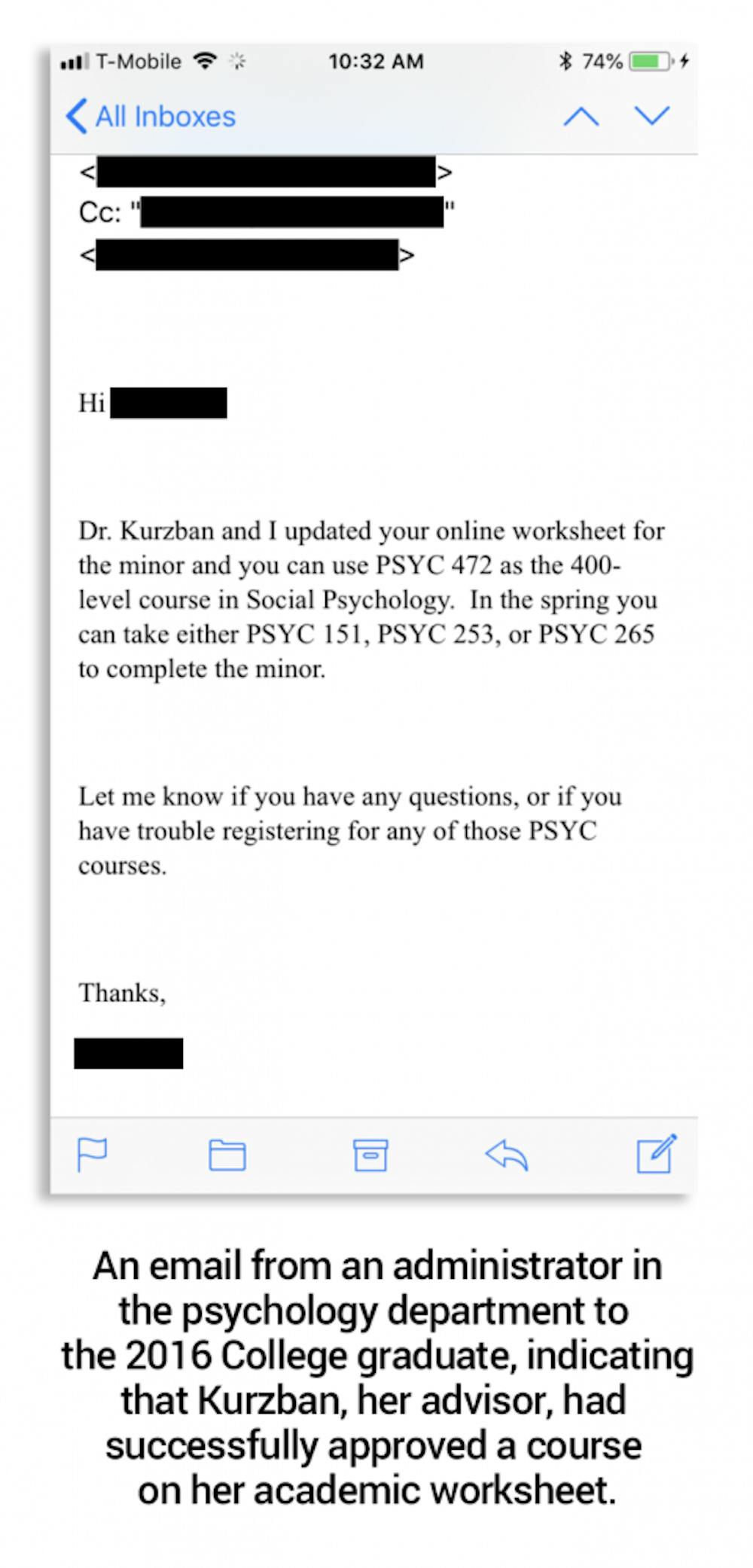
In his role as her minor advisor in consumer psychology, Kurzban had direct academic oversight over the student, a 2016 College graduate. She often discussed details of her coursework with him, and he approved a course within her consumer psychology minor during her undergraduate career.
The student, who was 21 years old at the time, said she met with Kurzban in his apartment in Center City in the spring of 2016, where they kissed. Three of her friends, all of whom were 2016 College graduates, independently confirmed to the DP that the student had told them about the kiss on the same day that it happened. Consequently, the student said she indicated to Kurzban that she wanted to end the romantic relationship, but he continued to pursue her at least twice.
Kurzban said in an emailed statement that he remembers having “social” interactions with the student, but did not “specifically recall the details of all of these interactions” described by her.
“I recall having a good working relationship with this student when she was at Penn and, yes, I did see her in social settings after she had completed my class,” he said. “I did not think that any of our interactions were inappropriate or would make her feel in any way uncomfortable, and I am deeply sorry if I did cause her any discomfort. Reflecting on this situation, I am committed to being vigilant in my personal conduct in the future in all my interactions with others.”
The 2016 College graduate said she was disappointed with Kurzban’s response.
“The fact that he is unable to realize how his actions could have been uncomfortable to me or other students really speaks to the precarious nature of professor-student relationships in general,” she said.
A month before the DP published its April 11 story, Kurzban was apparently removed from his post as undergraduate chair of the Psychology Department. Professor Daniel Swingley is now listed as the department’s “Director of Undergraduate Studies,” and confirmed to the DP that he took on this role in March.
The Integrated Studies Program, which invites a select group of freshmen to study an interdisciplinary set of courses across science, mathematics, and the humanities, no longer lists him on its website as a professor within the program. ISP Director Karen Detlefsen confirmed in an email on April 25 that Kurzban is no longer associated with the program.
The University has made no public announcement about Kurzban’s status within the Psychology Department or ISP program, and he is still listed on Penn’s internal course registration system as the co-instructor for an honors seminar in the fall. The Director of the Undergraduate Honors Program in Psychology Sara Jaffee, who is slated to co-teach the course with Kurzban in the fall, did not respond to emails requesting comment.
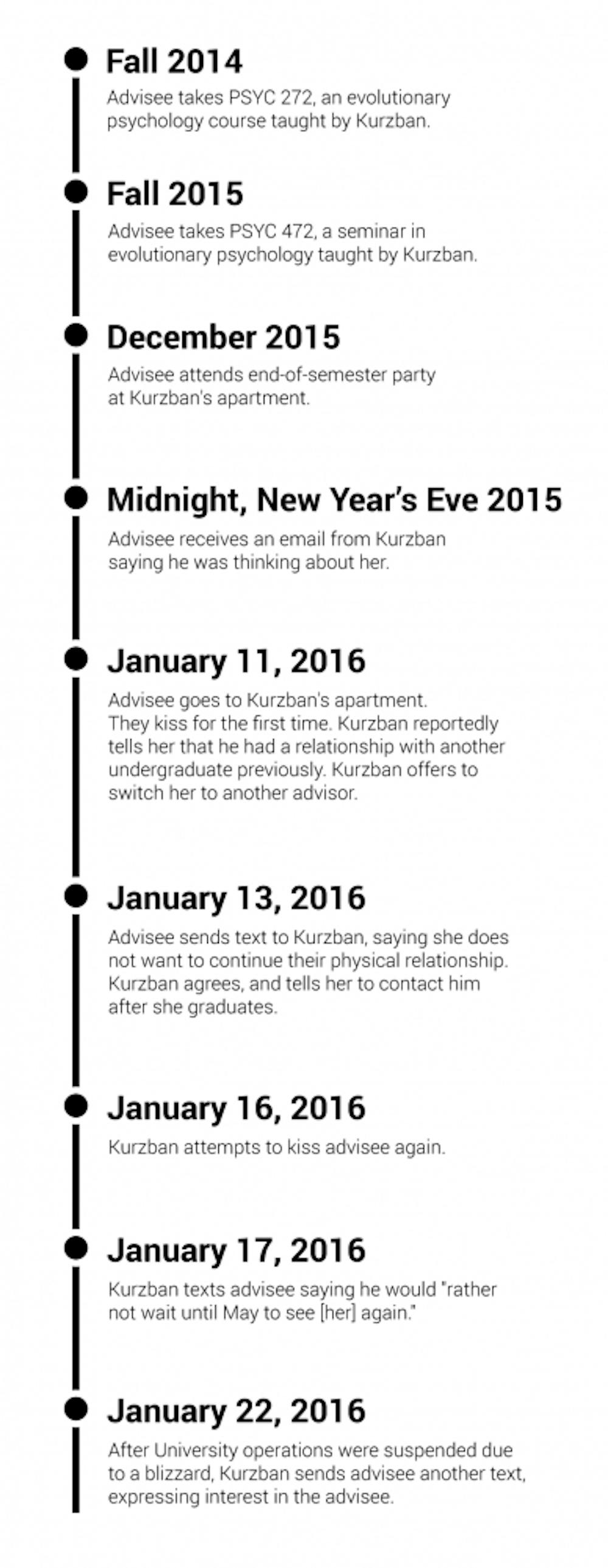
Two weeks after the allegations against Kurzban first emerged, the University has yet to publicly acknowledge the professor’s reported violations of University policy. When approached for comment on the first set of allegations brought against Kurzban, three of Penn’s top administrators did not respond, while two deferred to a statement from University spokesperson Stephen MacCarthy.
“We take all allegations of sexual misconduct seriously and investigate them,” MacCarthy wrote in the April 10 email. “However, we do not comment on individual personnel matters."
More recently, in response to inquiries on whether the Provost’s Office was aware of Kurzban’s alleged relationship with the 2016 College graduate, Executive Director of the Provost's Office Leo Charney replicated the same statement provided by MacCarthy. Charney did not address questions asking what students can expect from the University when administrative policies like this are violated and deferred questions on whether Kurzban would be teaching next semester to administrators in the College of Arts and Sciences.
“The question about Professor Kurzban’s teaching for next semester would be a question for his school or department,” he wrote.
Dean of the School of Arts and Sciences Steven Fluharty provided a statement saying that he was not aware of this relationship between Kurzban and his advisee, but did not address questions asking whether Kurzban would be teaching a class in the College next semester.
“The SAS Dean’s office, the College and the Department of Psychology are not aware of any prior complaints relating to policy violations, but we take such allegations very seriously,” he wrote in response to emails sent to him and the Chair of the Psychology Department Sharon Thompson-Schill.
Dean of the College of Arts and Sciences Paul Sniegowski and Associate Dean for Graduate Studies Eve Troutt Powell did not respond to multiple emails and calls asking to verify whether Kurzban would be teaching a course next semester.
• • •
The 2016 College graduate had already taken two courses with Kurzban when she agreed to visit his apartment on Jan. 11, 2016, the Saturday before the first week of spring classes, she said.
She knew the way to his apartment well, having been there only weeks before for an end-of-semester party with her classmates in Kurzban’s graduate seminar. He was one of her favorite professors and the two had spent months flirting in class and during advising sessions, she said.
One of the first times she thought he was romantically interested in her was at midnight on New Years Eve when he sent her an email that said he was thinking about her. The two exchanged numbers and began to text regularly in the days before she returned to campus for the spring semester. During one conversation, the student mentioned that she had been in Miami, where “it was warm enough to wear a tank top.”
Kurzban replied, “Don’t believe you’re in a tank top. I guess a picture would be convincing…” according to messages the student provided to the DP.
That January, the 2016 College graduate returned to campus early because of her role as a resident advisor. She made plans with Kurzban to go for a run or bike ride before classes started.
It ended up snowing on their scheduled day, so Kurzban suggested she come to his apartment, she told the DP. (Two of her close friends said the student had told them at the time that Kurzban initiated the meeting.)
Before Kurzban and the student kissed, the two spent time going over one of the papers the student wrote in Kurzban’s seminar, which explored the grief process she underwent after the sudden death of a close relative.
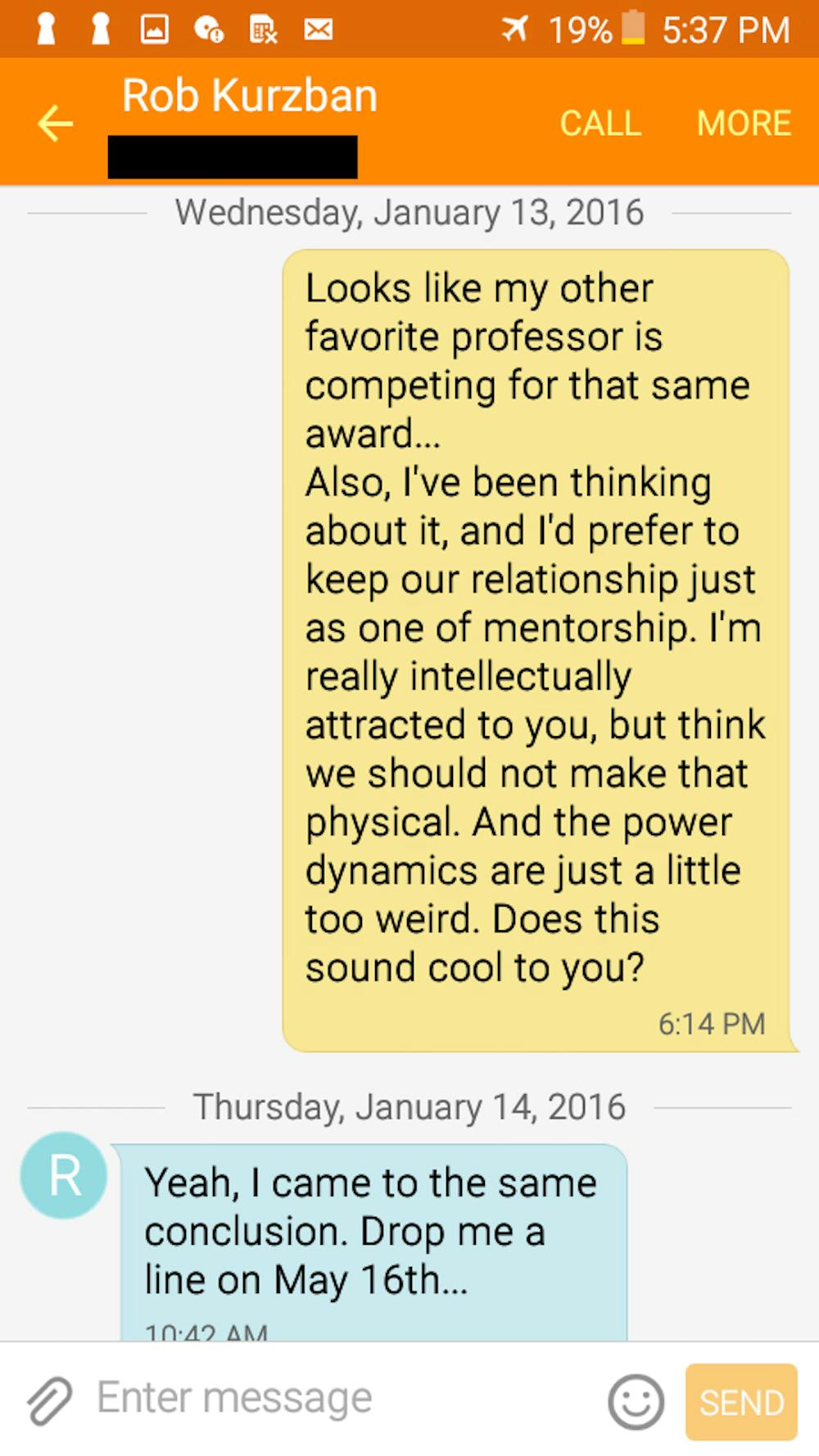
While they were at his apartment, Kurzban reportedly told the 2016 College graduate that he had conducted romantic relationships with other students before — “one while [the woman] was a student and many after they had graduated,” she recalled. Two of her friends who spoke to the DP said that they remembered her describing this conversation to them shortly after it occurred.
The student also said Kurzban offered to switch her to another advisor after they kissed, suggesting that he was aware of the University policy governing faculty-student relationships.
“He seemed to know the procedures pretty damn well,” she said. “I want other women who have had negative experiences with Kurzban in a sexual capacity (…) to feel comfortable to come forward. I know this isn’t an isolated event, and I know he has a track record of doing this — because he told me.”
After their initial kiss, the 2016 College graduate said she did not want to continue the relationship. She texted him two days later, saying, “I’ve been thinking about it, and I’d prefer to keep our relationship just as one of mentorship. I’m really intellectually attracted to you, but think we should not make that physical.”
She added, “The power dynamics are just a little too weird. Does this sound cool to you?”
Kurzban agreed, texting the student that he “came to the same conclusion” and to “drop me a line on May 16th,” the day after the College Graduation Ceremony.
• • •
Despite that conversation, the student said Kurzban continued to pursue her romantically.
Three days later, on Jan. 16, she ran into him while biking around the city, she said. Kurzban reportedly invited her up to his apartment and after chatting, he tried to kiss her again, she said. (One of her friends recalled hearing about this encounter from the student at the time.)
That night, at 12:35 a.m. on Jan. 17, Kurzban sent her a text.
“Well, that was nice. I confess I’d rather not wait until May to see you again,” he wrote.
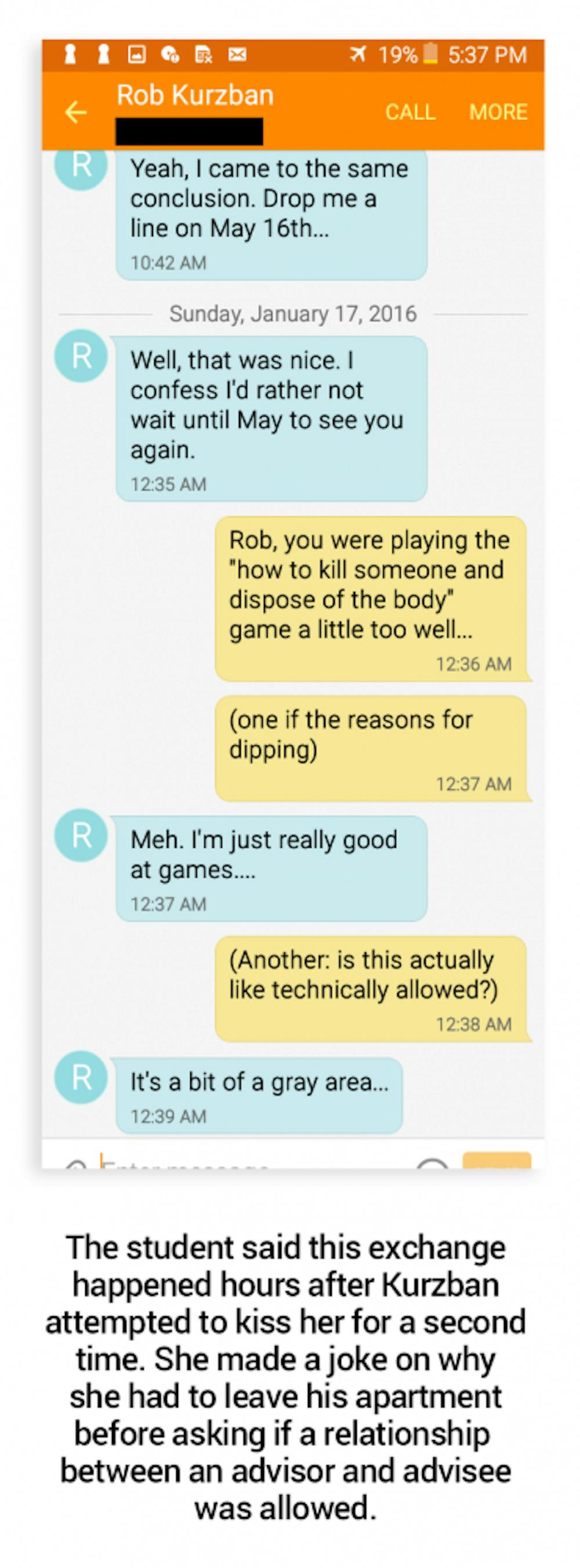
Slightly later on, when the student asked Kurzban if the relationship was “technically allowed,” he replied, “It’s a bit of a gray area…”
On Jan. 22, 2016, after University operations were suspended during a blizzard, Kurzban sent the student another text, expressing interest for the third time after the student had formally indicated that she wanted to ended the relationship.
“All normal rules of conduct are suspended during a blizzard,” he wrote, in what the student interpreted as a reference to Penn’s policies on faculty-student relationships.
“It was a booty call,” she said later. “I was also not interested and in New York, and I was like ‘haha yeah.’”
A month after this exchange, Kurzban emailed the student again asking whether she wanted to be nominated as a candidate for the undergraduate student speaker at the College Graduation Ceremony.
“You want to be nominated for this? I'm not sure I can because you're not a Psych Major, but I can find out. Let me know,” he wrote in an email later provided to the DP.
Years later, after reading the DP’s April 11 article, which uncovered Kurzban’s reported sexual relationship with a freshman in one of his courses, the student and her friends decided to share the account of her relationship with Kurzban.
“The article was a reminder of how his behavior was such a pattern,” she said. “I feel like this is my chance to make sure this doesn’t happen again.”
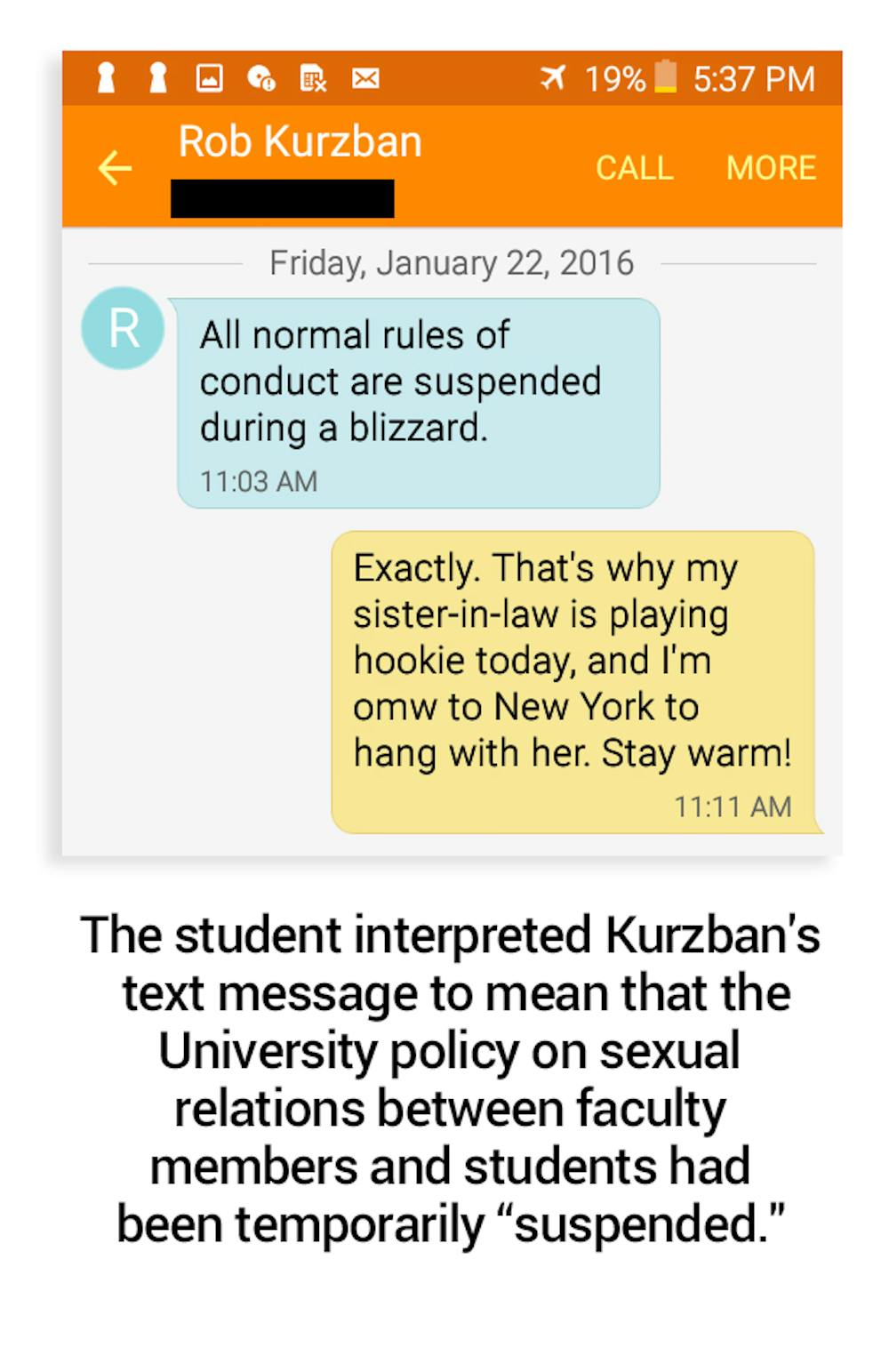
Chair of Abuse and Assault Prevention and College junior Kara Hardie said that the power dynamic involved in a faculty-undergraduate relationship can have dangerous implications.
“I think that there is a clear power dynamic at play in a professor-student relationship, specifically given that he was directly overseeing [and] teaching the students he was involved in,” Hardie said. “Power dynamics such as this can make it difficult if not impossible to give consent.”
Friends of the 2016 College graduate also noted that Kurzban’s behavior seemed inappropriate given the emotional state of the student, who had lost a close family member in 2015.
“Everything was consensual and she was excited about him, so in that respect, I wasn’t worried,” one close friend said. “Even though I knew she was fine, I felt like he couldn’t know how vulnerable she was or wasn’t.”
The student who had the relationship with Kurzban agreed.
“It seemed especially ironic that a professor of psychology didn't consider that someone's decision might be influenced by traumatic grief,” she said.
Executive Editor Rebecca Tan, Deputy News Editor Manlu Liu, and Senior Reporter Dan Spinelli contributed reporting to this story.
Have a tip? Send all news tips to newstip@thedp.com. For confidential tips, encrypt your message with our PGP key (fingerprint 8D74 A5C2 9AE2 E1A9 74CD C413 E076 396A CBAB 8925). Physical mail can be sent to Executive Editor Rebecca Tan at The Daily Pennsylvanian: 4015 Walnut St., Philadelphia, PA, 19104.
The Daily Pennsylvanian is an independent, student-run newspaper. Please consider making a donation to support the coverage that shapes the University. Your generosity ensures a future of strong journalism at Penn.
Donate




Most Read
Deputy Provost Beth Winkelstein to depart Penn, named next provost at Northeastern
Penn Medicine scrubs DEI webpages amid escalating federal crackdown
Penn reaffirms support for international students after federal restriction on Harvard’s enrollment
More Like This